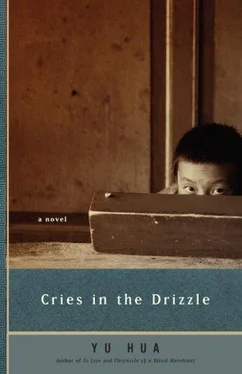When Sun Youyuan sat in a bamboo chair recalling his pretty young bride (once so well-to-do), his pallid face seemed all the more expressive, for its creases and furrows would start to undulate. I would often sneak a glance at the smiles that fluttered over his face like grasses in a breeze, smiles that strike me as poignant when I think about them now. But for me at the age I was then, I was simply astonished that someone could smile all by himself. When I shared this discovery with my big brother, who was down by the riverside catching shrimp, he ran home at a speed faster than I could manage, his excitement proving how right I was to be amazed. When we two grimy little boys arrived by Granddad's side, a smile was still playing delicately on his face. My brother acted with a boldness that was almost beyond my imagination, and his loud cries of protest jerked my grandfather out of his reveries. Granddad quivered from head to toe, as though struck by lightning; his mysterious smile vanished and his eyes filled with apprehension. My brother, still so immature, assumed a mantle of severity as he scolded Granddad: “How can you smile when you're on your own? Only loonies do that.” Then he waved his hand dis-missively: “In the future, you're not to smile by yourself, is that understood?”
Granddad, now clear on this point, gave a humble and deferential nod.
In his final years Sun Youyuan tried to get on the right side of everyone in the family, but given that he was our senior, his self-abasement could hardly win our respect. For a time I was pulled in two directions. On the one hand, I urged myself to follow Sun Guangping's example and throw my weight around with Granddad. For a child to issue orders to an adult, after all, is stirring stuff. But at the same time I was swayed by Granddad's kindly gaze, and when we exchanged glances, the warmth in his eyes made it impossible for me to flaunt some spurious authority. I could only leave the room in low spirits and go off in search of Sun Guangping, whose feistiness I admired.
After Granddad framed my little brother — and so coldbloodedly, too — I abandoned altogether any idea I might have had of bullying Granddad. From that time on my grandfather was for me a sinister, forbidding presence.
It all stemmed from a simple accident. As my grandfather rose from his corner one day, he happened to give the table a jolt and a bowl was knocked to the floor. I was close enough to see how Granddad froze in horror. He stood with his back to me, staring at the shards of china that now lay scattered at his feet. When I try now to recall the image of him standing there, I see only a hazy shadow. But I do remember that he came out with a long string of shocked whispers; never since have I heard anybody talk as rapidly as he did then.
Sun Youyuan did not clear away the broken pieces as I was expecting him to do. By now I was six, an age when I could dimly sense that something awful was going to happen, something involving my father, who was due to come home any minute. I had no idea how fearsome he would be when he lost his temper this time, but I knew that to a man as strong as him, shaking a fist was as easy and natural as it was for my mother to shake out her scarf. I stood there as Granddad sat down again in his corner, seemingly unperturbed, having made no effort to conceal the damage. His calm demeanor only intensified my unease. My young eyes veered uncertainly between the shattered bowl and my grandfather's face, and then I fled in alarm, as though I had stumbled on a snake.
As I had feared, Sun Kwangtsai was driven to new heights of manic anger by the loss of the bowl. Perhaps he was secretly hoping that Granddad was indeed the culprit, so as to justify the abuse he was always tempted to heap on him. His face flushed, Sun Kwangtsai shouted and screamed tirelessly like a child. His anger caught us three boys in its slipstream, reducing us to shivers as though we were being buffeted by a gale. When I glanced timidly at Sun Youyuan, he shocked me by standing up and meekly telling my father, “Sun Guangming broke it.”
My little brother, fidgeting at my side, did not take this in at all. There was alarm on his face, to be sure, but that came from Sun Kwangtsai's menacing expression. When my father, now boiling with rage, asked him, “Did you do it?” my little brother was scared speechless, and it was not until Sun Kwangtsai roared out this question a second time, pressing toward him threateningly, that I finally heard him speak up in his own defense: “It wasn't me.”
My little brother slurred his words. Right up until the day he died, he was prone to mumble. His response further inflamed my father, who was no doubt bent on making the most of this opportunity to blow off steam. He practically exploded, “If it wasn't you, how did the bowl get broken?”
My little brother looked utterly bewildered. Questioned thus, he could only shake his head in confusion. He was just too young; though able to issue a simple denial, he did not understand that testimony was needed to support his case. Worst of all, he was suddenly distracted by a bird outside and ran out the door to investigate. For my father, this was an intolerable provocation. Seething with fury, he yelled, “Come back here, you little son of a bitch!”
Although Sun Guangming knew enough to be frightened, he did not realize the gravity of the situation. No sooner was he back in the house than he pointed outside and gave what seemed to him a perfectly reasonable explanation for his exit. “There was a little bird!” he told Sun Kwangtsai, his eyes wide. “It was just there!”
My little brother's tender face took the full force of my father's flailing hand. He flew through the air and landed with a thump on the floor, where he lay in total silence for what seemed like forever. My mother, no less frightened than me by my father's rampages, cried out in alarm and ran to his aid. Then at last Sun Guangming started to bawl. Just as he did not knowwhy he had been slapped, he did not seem to know why he was crying either.
My fathers rage began to recede. He banged on the table and yelled, “What the hell are you crying about?”
Then he went outside. Inflamed by his own anger but softened by Sun Guangming's wails, he chose to give way. As he went out, he continued railing, “Wastrels! I have a house full of wastrels. The oldest one claims his back hurts just from walking and the youngest one is a full fucking four years old but still talks in a mumble like he's got a ball in his mouth. Each one is worse than the last. The way they're going, this house is heading for ruin.”
He capped this with a self-pitying coda: “Fate is so unkind to me!”
Events had unfolded so quickly: my father left before I had time to recover from the shock of what had happened. When I turned to glare at my grandfather, I found him still standing there, shaking like a leaf. Probably I had been too confused to immediately come to my little brother's defense: a six-year-old perhaps has slow reactions — or at least I did. But afterward this incident kept haunting me like a shadow in the moonlight. Although I wanted to expose Granddad, I could never bring myself to do so. Once, when nobody else was around, I did approach him. He was sitting in his sun-dappled corner, eyeing me in his usual benign way. But at that moment his affectionate gaze only made me shudder. With all the courage I could muster I said, “It was you who broke the bowl.”
Granddad calmly shook his head and at the same time smiled at me indulgently. His smile was like a mighty fist arcing toward me, and I had to force myself not to turn around and flee. In an effort to conceal my alarm I shouted, “It was you!”
My accusation, however just, failed to wrest a confession from Granddad, and he responded serenely, “It wasn't me.”
Читать дальше












